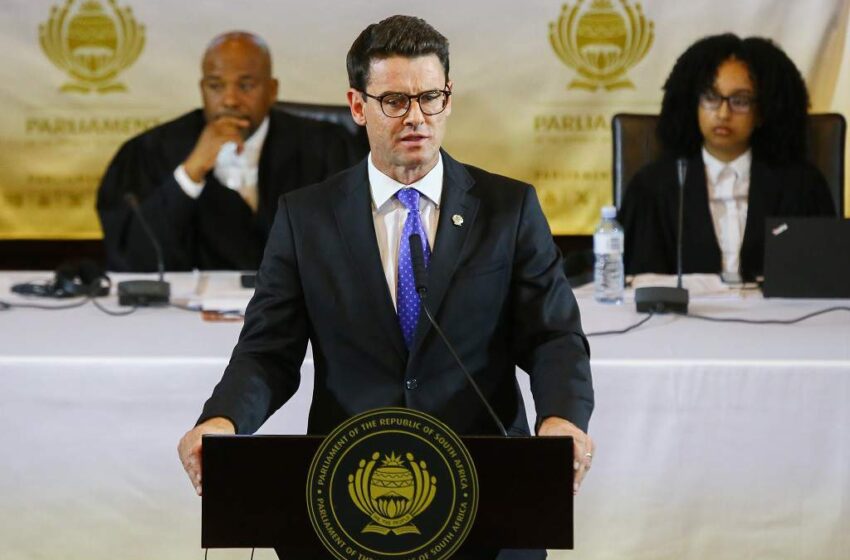Who is Andrew Whitfield? Meet South Africa’s deputy minister sacked by Ramaphosa

Who is Andrew Whitfield? Meet deputy trade minister sacked by Ramaphosa
The political atmosphere in South Africa was rattled on June 26, 2025, when President Cyril Ramaphosa fired Democratic Alliance (DA) stalwart Andrew Whitfield from his role as Deputy Minister of Trade, Industry and Competition. Whitfield, a seasoned public servant and rising star within the DA, has long been known for his bold approach to reform, clean governance, and security. His abrupt dismissal has since stirred political controversy and strained the already delicate ANC-DA coalition.
Background and Early Political Career
Andrew Grant Whitfield was born on 24 November 1982. He holds a Bachelor’s degree in Political Science and Industrial Psychology, along with an Honours in Political Science from Rhodes University. His political career began at the municipal level in 2011 when he was elected as a councillor for the DA in Nelson Mandela Bay.
Whitfield’s ascendancy was swift. He became a Member of Parliament in 2014, later serving in various capacities, including Mayoral Committee Member in Nelson Mandela Bay and a member of the Eastern Cape Provincial Legislature. In 2019, he returned to the National Assembly and was appointed the DA’s Shadow Minister of Police, a role in which he gained national attention for his vocal stance against crime and mismanagement in law enforcement.
Provincial Leadership and Policy Influence
Within the Democratic Alliance, Whitfield has held notable leadership positions. He was elected DA Eastern Cape provincial chairperson in 2017, re-elected in 2020, and became provincial leader in 2023. He earned a reputation as a results-oriented politician who advocated for ethical leadership, regional economic growth, and crime reduction.
Whitfield’s pragmatic approach made him a key figure in the DA’s negotiation with the ANC following the 2024 general elections, which produced a hung parliament. He was instrumental in establishing the DA’s participation in the Government of National Unity (GNU).
Appointment as Deputy Minister
In July 2024, Whitfield was appointed as Deputy Minister of Trade, Industry and Competition in the coalition government under President Cyril Ramaphosa. He worked closely with Minister Parks Tau, focusing on improving South Africa’s trade portfolio, advancing manufacturing growth, reducing bureaucratic barriers, and promoting investor confidence.
He was also actively involved in discussions related to the African Growth and Opportunity Act (AGOA) and South Africa’s G20 presidency agenda. His position was critical in pushing for trade liberalisation and economic reforms that aligned with the DA’s free-market principles.
READ ALSO
What Whitfield’s removal means for AGOA, G20, and South Africa’s trade strategy
The Trip That Sparked Controversy
The roots of Whitfield’s dismissal lie in a controversial overseas trip to the United States earlier in 2025. The trip, which was reportedly part of efforts to strengthen economic ties and promote South African industry, was not approved through proper government channels. Whitfield claims he submitted his travel request on February 12 and, having received no response after ten days, assumed tacit approval.
However, the Presidency later flagged the trip as unauthorized, referencing long-standing rules on ministerial travel and protocol. Some have compared the incident to historical dismissals such as those of Winnie Madikizela-Mandela and Nozizwe Madlala-Routledge, both of whom were also dismissed over travel-related disputes.
Ramaphosa’s Dismissal of Whitfield
On June 26, 2025, President Cyril Ramaphosa formally announced Whitfield’s dismissal. The announcement, made under Section 93(1) of the Constitution, offered no explanation beyond a thank-you for Whitfield’s service. Presidential spokesperson Vincent Magwenya emphasized that the president was not required to justify his decision to any coalition partners and that the move did not constitute a broader cabinet reshuffle.
The calculated silence from the Presidency has drawn criticism from political observers and opposition leaders, who believe the action may have been politically motivated rather than purely procedural.
DA Reaction and Political Fallout
The Democratic Alliance swiftly condemned the dismissal. DA federal leader John Steenhuisen described the move as a “calculated assault” on the coalition agreement and accused Ramaphosa of applying a double standard. Steenhuisen argued that Whitfield was fired not for wrongdoing, but for standing up against corruption and defending transparency within his ministry.
He further accused the President of hypocrisy, pointing out that ANC ministers accused of misconduct—such as David Mahlobo and Thembi Simelane—remain in office. The DA has since issued a 48-hour ultimatum, demanding that these ministers also be dismissed or risk consequences to the stability of the coalition.
Whitfield’s Legacy and Public Image
Andrew Whitfield remains one of the DA’s most prominent and respected figures. Known for his integrity, sharp intellect, and strong communication skills, he has earned praise across party lines. His work on public safety, trade facilitation, and governance reform has had measurable impact, particularly in the Eastern Cape and within national economic circles.
His dismissal has been met with concern from business groups and civil society, many of whom worry about the implications for coalition governance and South Africa’s international trade posture.
What’s Next for Whitfield and the GNU?
Whitfield has vowed to continue serving South Africans through the DA and has expressed gratitude for the opportunity to serve in the national executive. Meanwhile, the DA’s Federal Executive is set to meet and determine the party’s next steps in the unity government.
For the GNU, Whitfield’s dismissal marks a potential turning point. If not managed carefully, it could unravel the fragile cooperation between the ANC and the DA, with ripple effects on legislative processes, budget allocations, and South Africa’s international relations.
Andrew Whitfield’s sacking has ignited a firestorm of political debate, casting a spotlight on the fragile balance within South Africa’s Government of National Unity. Whether it was a procedural correction or a strategic political maneuver, the dismissal has intensified scrutiny of the ANC-DA coalition and the broader state of governance under Ramaphosa’s leadership.

